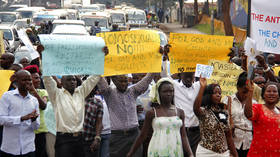Ugandan court rejects bid to scrap anti-gay law

Uganda’s Constitutional Court has rejected an appeal to annul an anti-LGBTQ law that imposes the death penalty for ‘aggravated homosexuality.’ Petitioners against the law, which also prescribes life in prison for same-sex intercourse and a prison sentence of up to 20 years for promoting homosexual activities, have labeled it as one of the toughest in the world.
The ruling on Wednesday comes despite widespread condemnation of the Anti-Homosexuality Act, which was passed last May, prompting the US to impose visa restrictions on the law’s sponsors and the World Bank to halt new funding for the East African nation.
The law also covers same-sex sexual acts with minors, disabled persons, or the elderly, as well as gay sex that transmits terminal illnesses such as HIV/AIDS. A group of 14 complainants, including lawmaker Fox Odoi-Oywelowo and Frank Mugisha, one of Uganda’s most prominent LGBTQ activists, petitioned judges to overturn the law, claiming it violated their constitutional rights.
“We decline to nullify the Anti-Homosexuality Act 2023 in its entirety, neither will we grant a permanent injunction against its enforcement,” Justice Richard Buteera, Uganda’s deputy chief justice and head of the court, concluded.
The jury, however, voided certain sections of the act that it deemed “inconsistent with the right to health, privacy, and freedom of religion,” ruling that members of the gay community should not face discrimination when seeking medical care. The court also determined that provisions of the legislation that demand citizens to report people they suspect of engaging in homosexual behavior violated individual rights.
In a statement on Wednesday, the International AIDS Society said it is “deeply concerned” about the ruling. It claimed that the number of clients in Uganda visiting drop-in centers that provide HIV prevention and treatment services to people, including “men who have sex with men,” has dropped from an average of 40 per week to two due to the law.
Edward Ssemambo, a human rights lawyer representing the petitioners, told Reuters that the government will now have to remove the portions of the law that the judges ruled were unsuitable.
Another complainant, Andrew Mwenda, said an appeal will be filed with the Supreme Court “not for striking down the different components of this law but for overturning this law in its entirety.”












